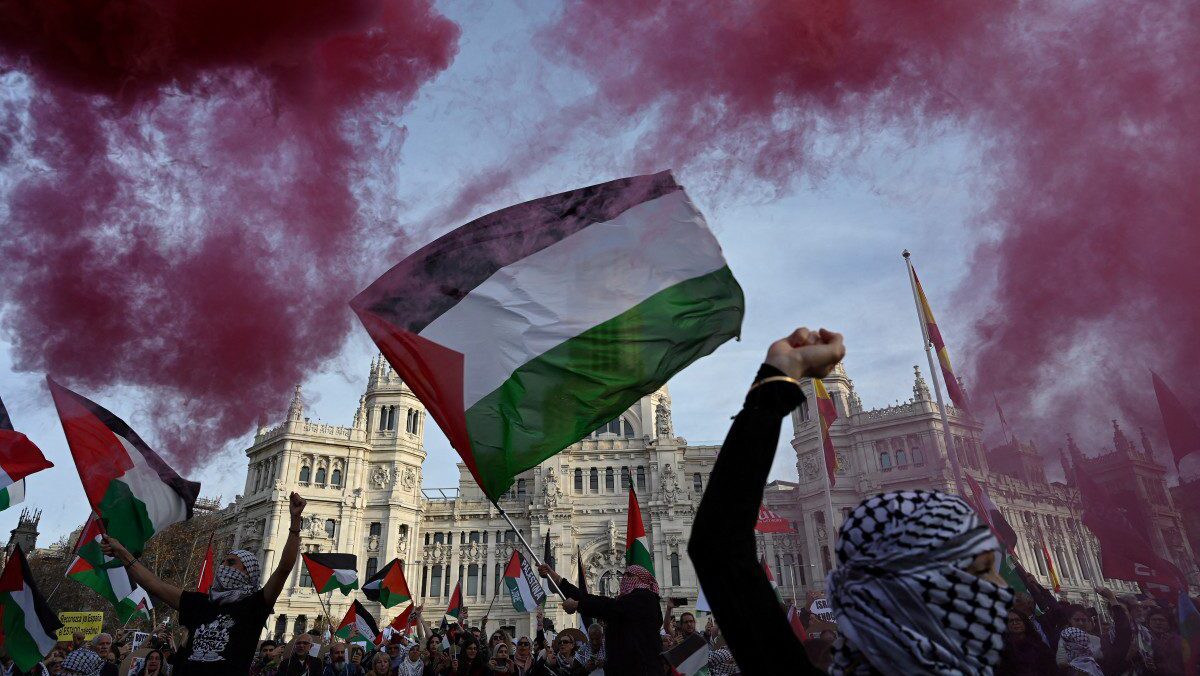
Pro-Palestine protesters in Madrid.
Photo: Javier Soriano / AFP
The countries of Spain, Ireland, and Norway are set to jointly recognize Palestinian statehood on Tuesday, May 28th, with Slovenia planning to join them at a later date. This makes them the first countries to do so while being EU member states, apart from Sweden’s 2014 recognition. Israel responded by recalling its ambassadors to all three countries, warning that the move would only embolden terrorists and jeopardize the peace process.
While some 140 countries already recognize the State of Palestine—including seven EU member states (Poland, Slovakia, Czechia, Hungary, Romania, Bulgaria, and Cyprus) that opened diplomatic relations before joining the bloc, as well as Sweden, which did so in 2014—Western Europe has largely considered the idea taboo—until now.
“We hope that our recognition and our reasons contribute to other Western countries following this path,” Spanish socialist PM Pedro Sánchez said, arguing that Europe needs to jointly “impose” a ceasefire agreement on Israel and that widespread recognition will eventually lead to realizing the two-state solution that is also the official position of the European Union.
While Sánchez focused on a message of peace, Spain’s deputy-PM Yolanda Díaz let the mask slip when she used the known Hamas motto “from the river to the sea” in her official address, implying support for the eradication of the State of Israel. This drew a sharp response from the Israeli ambassador to Spain:
Our total repudiation of the statements of Yolanda Díaz, Second Vice-President of the government, using the Hamas slogan ‘from the river to the sea’. This expression is a clear call for the elimination of Israel, fomenting hatred and violence. Anti-Semitic proclamations have no place in a democratic society, and it is absolutely intolerable that they should have been uttered by a deputy prime minister. I hope that Spain will honour the commitment to fight anti-Semitism that it made through the ‘National Plan for the implementation of the European strategy to combat anti-Semitism and promote Jewish life’.
Nuestra total repulsa a las declaraciones de Yolanda Díaz, Vicepresidenta Segunda del gobierno, al utilizar el lema de Hamás "desde el río hasta el mar". Esta expresión es un llamamiento claro a la eliminación de Israel, fomentando el odio y la violencia. Las proclamas… https://t.co/59br0hvp0I
— Embajadora de Israel 🇮🇱 (@Isr_Amb_Esp) May 23, 2024
Following Wednesday’s announcement of the joint recognition by the three countries, including the two most notoriously anti-Israel EU members, Spain and Ireland, Israel responded by recalling its ambassadors and summoning their envoys in Tel Aviv, where Foreign Minister Israel Katz said he’d make them watch a compilation of the brutal attacks carried out by Hamas militants on October 7th last year.
Israeli Prime Minister Benjamin Netanyahu said the recognition is a de facto award for the October 7th massacre, setting a dangerous precedent and emboldening Hamas to carry out further terrorist acts that invite Israeli retaliation, which then can be turned into Western sympathy.
“Rewarding terrorism will not bring peace and neither will it stop us from defeating Hamas,” the prime minister said, adding that the two-state solution cannot work unless the terrorists in charge of Palestine are eradicated. “This would be a terrorist state. It would try to carry out the October 7 massacre again and again—and that, we shall not agree to.”
The question of Palestine’s formal recognition has been a subject of debate in many other EU countries, but most do not see it happening at least until the end of the conflict, except in Slovenia. Ljubljana was the first to launch the recognition process in March but tied it to a set of “expectations, not conditions” for both sides, including reforming the Palestinian Authority and giving it power over both the West Bank and Gaza. No deadline has been set, however, and the decision still needs final approval from the Slovene parliament.
Germany, France, and Italy, Europe’s other heavyweights along with Spain, continue to reject the notion, at least for now. After a Weimar Triangle meeting earlier this week, French Foreign Minister Stephane Sejourne said Paris does not think recognition would have “much impact” given the diplomatic deadlock between Israel and Hamas, therefore it doesn’t plan to join the initiative.
“The logic is that the peace process leads to the state recognition … not that recognition is a diplomatic end in itself,” Sejourne said.
German Foreign Minister Annalena Baerbock was more direct when she said Berlin is not in favor of recognizing Palestine, adding that the focus should be on concrete negotiations instead of political posturing. “The hostages that are held must be liberated, humanitarian aid must enter Gaza. Without that, it is not real to imagine a diplomatic solution for the Palestinians,” Baerbock stressed.
Italy announced it would not recognize Palestine either, but expressed support for a gradual two-state solution based on the two parties’ mutual recognition of each other. “The Palestinian state must then recognize Israel and Israel in turn must recognize Palestine. … We need to start a path with both Israelis and Palestinians to achieve mutual recognition,” Foreign Minister Antonio Tajani said.
Perhaps the most explicit rejection of Palestinian statehood was delivered by the national conservative Geert Wilders, head of the largest party in the Dutch parliament.
“[Hamas] is out to destroy the Jewish state and kill its inhabitants. For me and [the PVV] it is not difficult to see with whom we stand in solidarity,” Wilders said in the Hague. “Are we with the Jewish people, who are fighting for their existence, or are we with the Islamic, extremist, terrorist scum who want to exterminate them? Until the very end, I support the State of Israel.”
After the disappointing news from Ireland, Norway and Spain today, the new kingmaker of Dutch politics, @geertwilderspvv showed the way
— Visegrád 24 (@visegrad24) May 22, 2024
Speaking in Parliament, he made it clear who is the aggressor & who should be supported
“I’m with Israel all the way” pic.twitter.com/u6bVKpd2wd
